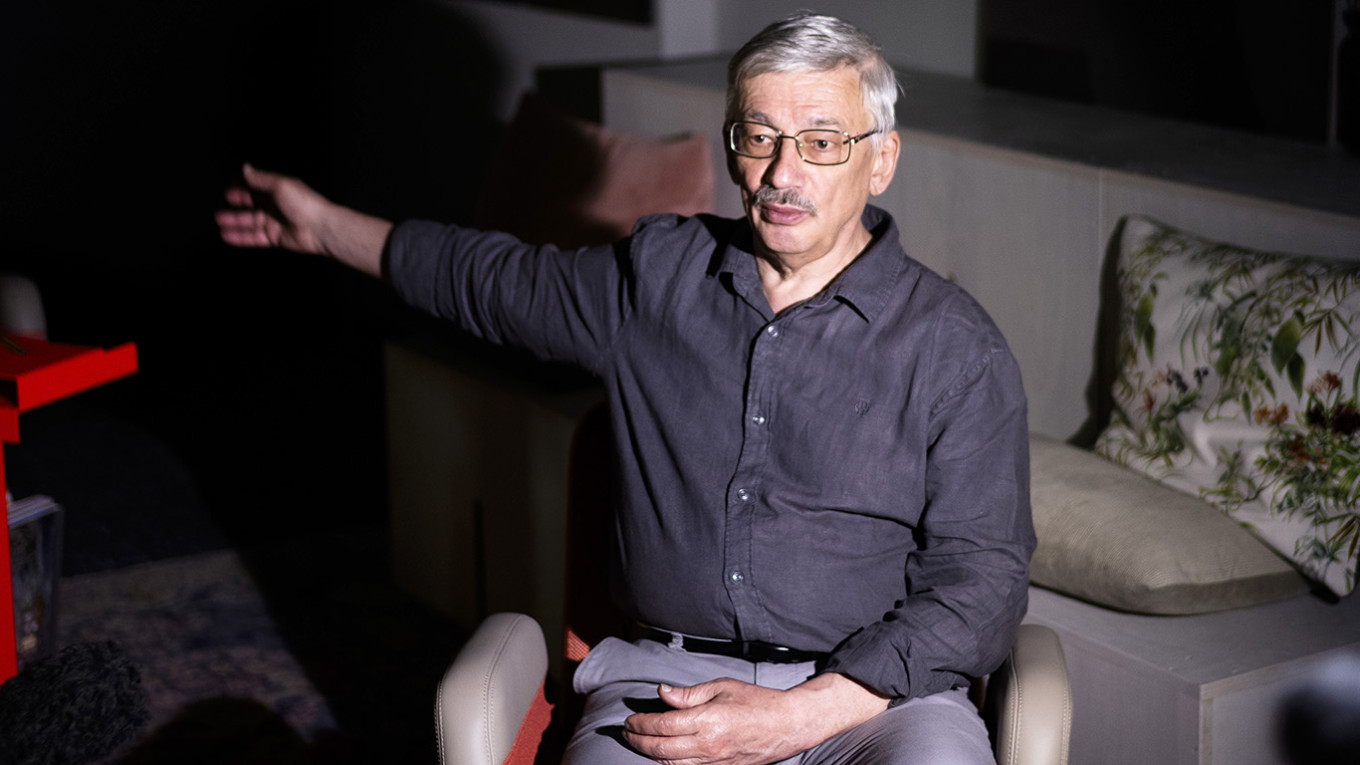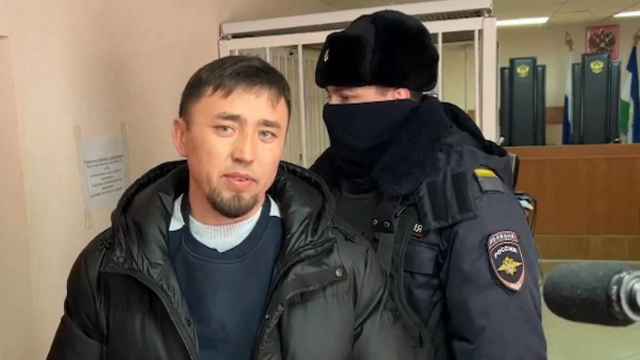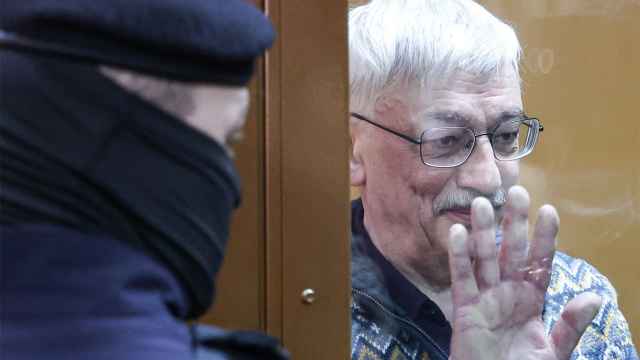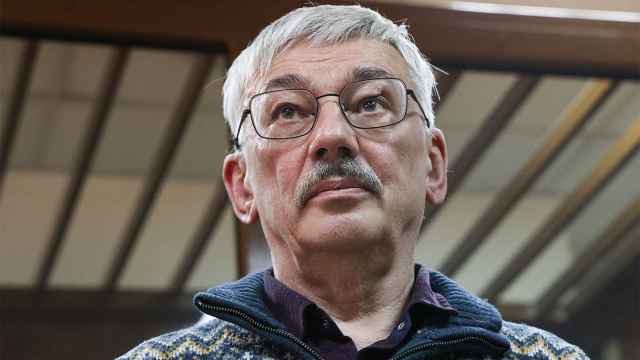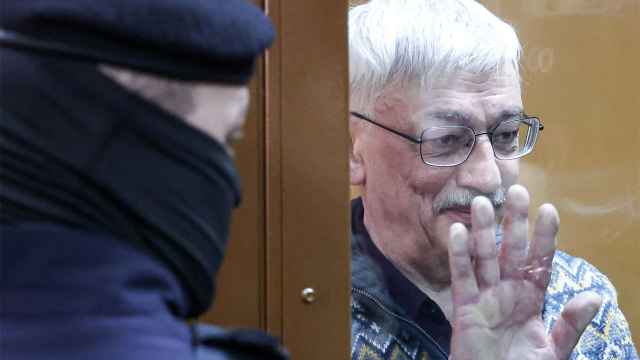Veteran human rights defender Oleg Orlov was one of the 16 prisoners freed by Russia on Aug. 1 in a historic exchange between Russia and the West.
Orlov, 71, a vocal critic of the invasion of Ukraine, had been imprisoned this year for “discrediting” the Russian army’s actions in Ukraine.
A co-chair of the Nobel Peace Prize-winning Memorial human rights group, he has said many times that his will was to remain in Russia even as a sweeping crackdown on dissent forced most other critics to leave the country.
The Moscow Times spoke to Orlov about his exchange and the challenges faced by Russian human rights defenders who have been forced out of the country but remain committed to continuing their work.
This interview has been edited for length and clarity.
MT: What emotions did you feel on the day of the exchange?
OO: The emotions I felt on the day of the exchange were complex. I'm not sure if it was right for me to be there. In my view, it was unjust and unfair that I was on the [prisoner exchange] list while many people who should have been there were not. It's unfair. It would have been more just to exchange them.
That morning, there was complete confusion about what was happening [due to the transfer from the colony before the exchange] — different scenarios were running through my mind. I thought they might talk to me about opening a new criminal case or demand something else from me. Then they showed me a decree for my release due to a presidential pardon. Although I hadn't written any request [for a pardon], at that moment I realized I was being exchanged.
On the bus [on the way to the airport], I felt joy because I saw Sasha Skochilenko — I knew her situation and the conditions she was in. I was so happy to see her, and I think she was happy to see me. We recognized each other, although we hadn't met in person before. It's a special kind of joy when you see other political prisoners [finally free]! In front of her was Andrei Pivovarov, and in front of him was Lilia Chanysheva. I felt that same joy again when I saw Vladimir Kara-Murza. But then anxiety and confusion set in. Where is Alexei Gorinov? Why isn't he here with us? Where are the other political prisoners? That's when the feeling starts — why me?
As we were driving to the airport, the bus windows had no bars, and there were these huge, beautiful clouds in the sky — we hadn’t seen the sky above our heads in so long. There's this feeling of freedom already, this joy of being released, but at the same time, there's a gnawing inside — this is Moscow, and maybe it's the last time I'll see it, or I won't see it again for a long time. And the other political prisoners aren’t with us. It's such a complex emotional experience.
Could you describe the conditions you were held in? How is your health?
Everything is fine. I got sick a few times. But who doesn’t get sick there? Everyone there is ill. I had a severe cold — it was serious, though I experienced some hearing loss during the illness. Now, after being examined here in Germany, they said everything seems fine, although I’m deficient in vitamin D — but that's common and can be replenished by being outside in the sun. I hope to recover. But just because I had a relatively easier time doesn’t mean my fellow prisoners did too — certainly not. You can see from the condition of some of the others that imprisonment took a much heavier toll on them. For example, we know that Kara-Murza faced constant abuse [in the colony]. I didn’t experience that. I was in various pre-trial detention centers (SIZOs), and conditions varied in each.
Sometimes, it was a tiny, overcrowded cell with more people than beds, and sometimes the cell had nothing but a single kettle — no teapot, nothing at all. As for refrigerators or televisions, those were out of the question. None of the regulations were followed. But I was also in cells where things were more or less in order, where the living conditions were relatively decent and organized — at least as much as they could be.
In the last months, I was in a small cell, 2 by 4 meters, which included a toilet, a sink, a bunk bed, a small table, and two stools, leaving almost no room to move around. That’s the kind of two-person cell I lived in.
No one had refrigerators or TVs; the library didn’t work, and initially, the prison store didn’t either. But on the other hand, these weren’t the worst conditions — it could have been much worse, and I didn’t complain.
You’ve been free for two weeks now. Can you imagine living outside of Russia?
No, I can’t yet imagine living outside of Russia. I’m only beginning to adapt, and I understand that it will be very difficult. Regarding human rights work in Russia and abroad — sometimes it’s possible, sometimes it’s not. We’ll see, but in any case, I will continue working at the Memorial Human Rights Center. And, of course, what’s on all our minds — especially mine, since it’s my responsibility and duty — is the release of political prisoners in Russia.
How are you planning to settle into your new life?
I need to sort out some practical, financial matters. I don’t have my passport with me, and I have a [German] visa on a separate sheet of paper for 15 days. Now, I need to organize my status and paperwork. My colleagues at Memorial are helping me a lot with the practical side of things.
In an interview with The Moscow Times ahead of your sentencing in February, you said you believed in a better future for the country...
I still believe that a better future is possible. However, I’ve come to see some additional challenges in communicating with people who are very different, people whose vision of Russia’s future is completely unlike mine — people who don’t think about the same things that I and my colleagues do. But I felt there was hope because, throughout my time in captivity, I was always able to find common ground, to build normal, even friendly, relationships with all the other prisoners, no matter how different they were. You can always find a common language and something that connects us. That’s why I believe that Russia’s future will be good. I think that all of us who have been exiled from Russia will be able to return without the immediate threat of imprisonment within 10 years. That might seem like a terribly long time, but perhaps it will be shorter. But I believe that within no more than 10 years, we will return to Russia. It may not yet be the "beautiful Russia of the future," but we will be able to begin the real work of building that beautiful future there.
A Message from The Moscow Times:
Dear readers,
We are facing unprecedented challenges. Russia's Prosecutor General's Office has designated The Moscow Times as an "undesirable" organization, criminalizing our work and putting our staff at risk of prosecution. This follows our earlier unjust labeling as a "foreign agent."
These actions are direct attempts to silence independent journalism in Russia. The authorities claim our work "discredits the decisions of the Russian leadership." We see things differently: we strive to provide accurate, unbiased reporting on Russia.
We, the journalists of The Moscow Times, refuse to be silenced. But to continue our work, we need your help.
Your support, no matter how small, makes a world of difference. If you can, please support us monthly starting from just $2. It's quick to set up, and every contribution makes a significant impact.
By supporting The Moscow Times, you're defending open, independent journalism in the face of repression. Thank you for standing with us.
Remind me later.



